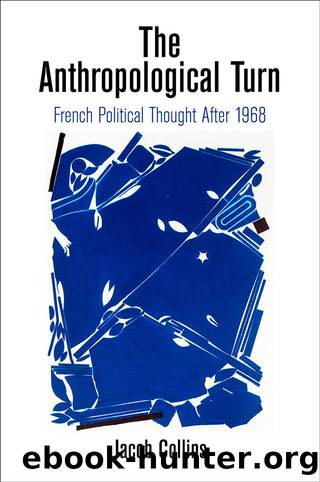The Anthropological Turn by Jacob Collins

Author:Jacob Collins [Collins, Jacob]
Language: eng
Format: epub
ISBN: 9780812297027
Publisher: University of Pennsylvania Press, Inc.
Published: 2020-11-15T00:00:00+00:00
The Detour Through English Social History
Perhaps then it is not so surprising that Emmanuel Todd encountered Le Playâs work not in France but in the English university system. At Cambridge, Le Play had found a new hearing in the 1960s among English social historians, principally Peter Laslett, who supervised Toddâs thesis in the 1970s. Laslett was a protean figure in English history. His first essays, written soon after World War II, tried to understand how âEngland,â in reality an assemblage of local actors, became a meaningful entity at the national level in the seventeenth century; how, in other words, âthe community of the countryâ was formed out of âthe community of the locality.â49 For Laslett, the family played this crucial role. English society was dominated by a network of locally powerful patriarchs who âmediated between the individualâ and âEnglish society as a whole.â Families were, as such, âunits through which political attitudes were formulated and spread about; also instruments through which pressure was brought to bear on government.â They even helped knit together city and country, for âit must not be forgotten that, in marrying into a landed family, the heir of a city merchant . . . was submitting to an authoritarian system and entering into a set of relationships which would inevitably involve all the descendants of the marriage.â50
This investigation of family life did not, however, lead directly into social and demographic history, for Laslett became interested in the texts and political ideas that were circulating among members of the gentry in manuscript form.51 One of his discoveries was Sir Robert Filmerâs Patriarcha, or the Natural Power of Kings, an important tract from the Civil War era that was lost to posterity and that Laslett published with commentary in 1949. In his edition, Laslett paid close attention to the conditions under which Patriarcha was produced, circulated, and read, both in Filmerâs lifetime and in the decades after his death in the 1650s, when the text had a wider audience.52 Naturally, his work on Filmer drew him toward the latterâs most powerful and influential critic, John Locke. Using the same style of contextual analysis, Laslett determined that Lockeâs Two Treatises of Government was a tract written in response to the Exclusion Crisis of the early 1680s and not a revolutionary text written to justify 1688.
Laslettâs approach marked, for historians like J. G. A. Pocock, the creation of what has become known as âthe Cambridge Schoolâ of intellectual history, a contextualist mode of interpretation placing primary emphasis on the historical circumstances in which a text was produced and read.53 Before the âSchoolâ had even registered a presence on the intellectual scene, however, Laslett shifted again, now developing an interest in the linguistic philosophy and logical positivism overtaking Cambridge by way of Ludwig Wittgenstein and Karl Popper in the 1950s. Beginning in 1957, he edited a series of books, Philosophy, Politics, and Society, in which he proclaimed political philosophy to be dead and expressed doubt that a statement could have any meaning beyond its immediate linguistic contexts.
Download
This site does not store any files on its server. We only index and link to content provided by other sites. Please contact the content providers to delete copyright contents if any and email us, we'll remove relevant links or contents immediately.
| Anthropology | Archaeology |
| Philosophy | Politics & Government |
| Social Sciences | Sociology |
| Women's Studies |
Cecilia; Or, Memoirs of an Heiress — Volume 1 by Fanny Burney(31322)
Cecilia; Or, Memoirs of an Heiress — Volume 3 by Fanny Burney(30928)
Cecilia; Or, Memoirs of an Heiress — Volume 2 by Fanny Burney(30885)
The Great Music City by Andrea Baker(21195)
We're Going to Need More Wine by Gabrielle Union(18064)
Bombshells: Glamour Girls of a Lifetime by Sullivan Steve(13100)
Pimp by Iceberg Slim(12922)
All the Missing Girls by Megan Miranda(12739)
Fifty Shades Freed by E L James(12443)
Norse Mythology by Gaiman Neil(11873)
Talking to Strangers by Malcolm Gladwell(11861)
Crazy Rich Asians by Kevin Kwan(8340)
Mindhunter: Inside the FBI's Elite Serial Crime Unit by John E. Douglas & Mark Olshaker(7827)
The Lost Art of Listening by Michael P. Nichols(6462)
Enlightenment Now: The Case for Reason, Science, Humanism, and Progress by Steven Pinker(6402)
Bad Blood by John Carreyrou(5761)
The Four Agreements by Don Miguel Ruiz(5502)
Weapons of Math Destruction by Cathy O'Neil(5029)
We Need to Talk by Celeste Headlee(4861)
